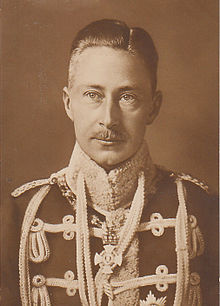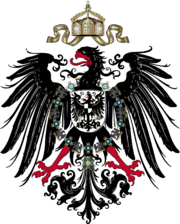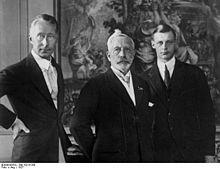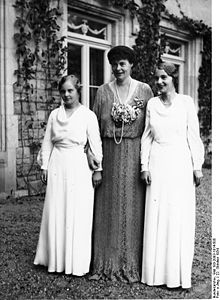- William, German Crown Prince
-
"Crown Prince Wilhelm" redirects here. For ships of this name, see Kronprinz Wilhelm (disambiguation)."Wilhelm of Prussia" redirects here. For other uses, see Wilhelm of Prussia (disambiguation).
William German Crown Prince, Crown Prince of Prussia 
Head of the House of Hohenzollern Period 4 June 1941 – 20 July 1951
(10 years, 46 days)Predecessor Wilhelm II Successor Prince Louis Ferdinand Spouse Cecilie of Mecklenburg-Schwerin Issue Prince Wilhelm
Prince Louis Ferdinand
Prince Hubertus
Prince Friedrich
Princess Alexandrine
Princess CecilieHouse House of Hohenzollern Father Wilhelm II of Germany Mother Augusta Viktoria of Schleswig-Holstein Born 6 May 1882
Potsdam, Brandenburg, German EmpireDied 20 July 1951 (aged 69)
Hechingen, GermanyPrussian Royalty House of Hohenzollern 
Wilhelm II Children William, German Crown Prince Prince Eitel Friedrich Prince Adalbert Prince August Wilhelm Prince Oskar Prince Joachim Victoria Louise, Duchess of Brunswick Frederick William Victor Augustus Ernest (German: Friedrich Wilhelm Victor August Ernst) (6 May 1882 – 20 July 1951) of the House of Hohenzollern was the last Crown Prince of the Kingdom of Prussia and the German Empire. He was colloquially known as William or Wilhelm throughout Europe.
Contents
Early life
William was born in the Marmorpalais of Potsdam in the Province of Brandenburg. He was the eldest son of Wilhelm II, German Emperor (1859–1941) and his first wife Princess Augusta Viktoria of Schleswig-Holstein (1858–1921). When he was born, he was third in line for the throne, behind his grandfather and father, as the reigning emperor was his great-grandfather, William I. He was the eldest of the Kaiser's seven children, and his birth sparked an argument between his parents and grandmother. Before William was born, his grandmother had expected to be asked to help find a nurse, but since her son did everything he could to snub her, Wilhelm asked his aunt Helena to help. His mother was hurt and his grandmother furious.[1] When his great-grandfather and grandfather died in 1888, he became the heir to the German throne.
William was a supporter of football, then a relatively new sport in the country, donating a cup to the German Football Association in 1908 and thereby initiating the Kronprinzenpokal, the oldest cup competition in German football.[2]
World War I
Despite being raised within militaristic circles, the Crown Prince had little command experience when he was named commander of the 5th Army in August 1914, shortly after the outbreak of World War I. In November 1914 William gave his first interview to a foreign correspondent and the first statement to the press made by a German noble since the outbreak of war.[3][4] He said this in English:
"Undoubtedly this is the most stupid, senseless and unnecessary war of modern times. It is a war not wanted by Germany, I can assure you, but it was forced on us, and the fact that we were so effectually prepared to defend ourselves is now being used as an argument to convince the world that we desired conflict."He led the 5th Army until November 1916, a two-year period which included the battle of attrition known as the Verdun Offensive. From April 1916 onward, he tried in vain to convince the supreme command that the Verdun offensive no longer made any sense, but the campaign continued until 2 September of that year.
After the German revolution
After the outbreak of the German Revolution in 1918, both Emperor William II and the Crown Prince signed the document of abdication. The Crown Prince went into exile on the island of Wieringen, in the Netherlands. In 1923, he returned to Germany after giving assurances that he would no longer engage in politics. The former Crown Prince held some political ambitions, and was reportedly interested in the idea of running for Reichspräsident as the right-wing candidate opposed to Paul von Hindenburg in 1932, until his father forbade him from acting on the idea.[citation needed]
The Crown Prince supported Hitler for some time, hoping and announcing in public that this man would do for Germany what Mussolini had done for Italy - make an end to all Bolshevist/Marxist influence. He had connections with some organisations more than loosely connected with the Nazi Party and allowed himself to be used by the Nazi government in various symbolic actions.[citation needed] After the murder of his friend, the former Chancellor Kurt von Schleicher, in the Night of the Long Knives (1934), he retreated from all political activities. Most of his efforts from 1919 until 1934 had been directed to making a return of the Hohenzollerns to the throne a viable option, and he had assumed that Hitler would give this idea his support.[citation needed]
William lived as a private citizen on his family's estates throughout World War II. Upon his father's death in 1941, he succeeded him as head of the House of Hohenzollern, the former German imperial dynasty. In 1951, the former Crown Prince died of a heart attack in Hechingen, in the ancestral lands of his family in Swabia, as the family's estates in Brandenburg had been occupied by the Soviet Union.[citation needed] William and his wife are buried at Hohenzollern Castle.[5]
Family and children
William married Duchess Cecilie of Mecklenburg-Schwerin (20 September 1886 – 6 May 1954) in Berlin on 6 June 1905. Cecilie was the daughter of Grand Duke Frederick Francis III of Mecklenburg-Schwerin (1851–1897) and his wife, Grand Duchess Anastasia Mikhailovna of Russia (1860–1922). Their eldest son, Prince Wilhelm of Prussia, was killed fighting for the German Army in France in 1940. However, during the early stages of his marriage the crown prince had a brief affair with the American opera singer Geraldine Farrar, and he later had a relationship with the dancer Mata Hari.[citation needed]
Their children and male-line grandchildren are:
- Prince Wilhelm of Prussia (1906–1940), who renounced his succession right. He married Dorothea von Salviati and had issue.
- Princess Felicitas of Prussia (1934–2009)
- Princess Christa of Prussia (born 1936)
- Louis Ferdinand, Prince of Prussia (1907–1994); married Grand Duchess Kira Kirillovna of Russia and had issue.
- Prince Hubertus of Prussia (1909–1950); married Baroness Maria von Humboldt-Dachroeden and Princess Magdalena Reuss of Köstritz, had issue.
- Princess Anastasia of Prussia (born 1944)
- Princess Marie-Christine of Prussia (1947–1966)
- Prince Frederick of Prussia (1911–1966); married Lady Brigid Guinness and had issue.
- Prince Frederick Nicholas of Prussia (born 1946)
- Prince Andrew of Prussia (born 1947)
- Princess Victoria of Prussia (born 1952)
- Prince Rupert of Prussia (born 1955)
- Princess Antonia of Prussia (born 1955)
- Princess Alexandrine of Prussia (1915–1980), called "Adini", had Down syndrome
- Princess Cecilie of Prussia (1917–1975), married American interior architect Clyde Harris in 1949, settled with him in Amarillo, Texas and had a daughter in 1954.
Their surviving descendants are also in the Line of British succession.
Titles, styles, honours and arms
Titles and styles
- 6 May 1882 – 15 June 1888: His Royal Highness Prince William of Prussia
- 15 June 1888 – 20 July 1951: His Imperial and Royal Highness The German Crown Prince, Crown Prince of Prussia
Ancestry
Notes
- ^ Queen Victoria's Family, A Century of Photographs, Charlotte Zeepvat
- ^ Kick it like Kronprinz (German) Spiegel Online, accessed: 11 June 2009
- ^ a b Elter page 74
- ^ a b Wiegand page 3
- ^ www.preussen.de: Wilhelm, Cecilie
References
- Andreas Elter (April 2003) (in German) (PDF), Die andere Front: Pressepolitik in den USKriegen des 20. Jahrhunderts, Cologne, http://deposit.ddb.de/cgi-bin/dokserv?idn=968575013&dok_var=d1&dok_ext=pdf&filename=968575013.pdf, retrieved 2009-04-05
- Karl Henry von Wiegand (1915), Current misconceptions about the war, 1123 Broadway, New York: The Fatherland corporation, inc., http://www.archive.org/details/currentmisconcep00vonw, retrieved 2009-04-05, "Copyright 1914, United Press ... 20 November"
External links
William, German Crown PrinceBorn: 6 May 1882 Died: 20 July 1951Titles in pretence Preceded by
Emperor William II— TITULAR —
German Emperor
King of Prussia
4 June 1941 – 20 July 1951
Reason for succession failure:
Empire / Kingdom abolished in 1918Succeeded by
Louis Ferdinand, Prince of PrussiaPretenders to the German and Prussian thrones since 1918  1918 Emperor Wilhelm II · 1941 Crown Prince William · 1951 Prince Louis Ferdinand · 1994 Prince Georg Friedrich
1918 Emperor Wilhelm II · 1941 Crown Prince William · 1951 Prince Louis Ferdinand · 1994 Prince Georg Friedrich1st generation 2nd generation Frederick Louis, Prince of Orange · Frederick William, Prince of Orange · Frederick II · Prince Louis Charles William · Prince Augustus William · Prince Henry · Prince Augustus Ferdinand3rd generation Frederick William II · Prince Henry · Prince Emil · Prince Henry · Prince Christian · Prince Louis Ferdinand · Prince Paul · Prince Augustus4th generation 5th generation Prince Frederick · Prince Charles · Frederick William IV · William I · Prince Charles · Prince Ferdinand · Prince Albert · Prince Tassilo · Prince Adalbert · Prince Tassilo · Prince Waldemar6th generation Prince Alexander · Prince George · Prince Frederick Charles · Frederick III · Prince Albert of Prussia7th generation William II · Prince Henry · Prince Sigismund · Prince Frederick Leopold · Prince Waldemar · Prince Frederick Henry Albert · Prince Joachim Albert · Prince Friedrich Wilhelm8th generation William, Crown Prince · Prince Eitel Frederick · Prince Adalbert · Prince Augustus William · Prince Oskar · Prince Waldemar · Prince Joachim · Prince Friedrich Sigismund · Prince Frederick Charles · Prince Frederick Leopold · Prince Sigismund · Prince Henry9th generation Prince Wilhelm · Louis Ferdinand, Prince of Prussia · Prince Hubertus · Prince Frederick · Prince Alexander Ferdinand · Prince Oskar · Prince Karl Franz · Prince Burchard · Prince Wilhelm Viktor · Prince Friedrich Karl · Prince Wilhelm-Karl · Prince Alfred10th generation Prince Friedrich Wilhelm · Prince Stephan · Prince Michael · Prince Franz Wilhelm · Prince Friedrich Christian · Prince Louis Ferdinand · Prince Franz Friedrich · Prince Christian-Sigismund · Prince Nicholas · Prince Andrew · Prince Adalbert · Prince Rupert · Prince Wilhelm-Karl · Prince Oskar11th generation Georg Friedrich, Prince of Prussia · Grand Duke George Mikhailovich of Russia · Prince Alexander · Prince Frederick · Prince Christian Ludwig · Prince Christian · Prince Frederick Nicholas · Prince Oskar · Prince AlbertCategories:- Prussian princes
- Heirs apparent who never acceded
- Pretenders to the German throne
- People from Potsdam
- People from the Province of Brandenburg
- German generals
- German military personnel of World War I
- Recipients of the Pour le Mérite (military class)
- Recipients of the Military Order of Max Joseph
- Knights of the Garter
- Knights of the Golden Fleece
- Recipients of the Order of the Black Eagle
- Knights Grand Cross of the Order of St. Olav
- 1882 births
- 1951 deaths
- House of Hohenzollern
- Recipients of the Order of St. Andrew
- Knights of the Elephant
- Crown Princes of Prussia
- Royalty in Nazi party
- Prince Wilhelm of Prussia (1906–1940), who renounced his succession right. He married Dorothea von Salviati and had issue.
Wikimedia Foundation. 2010.



